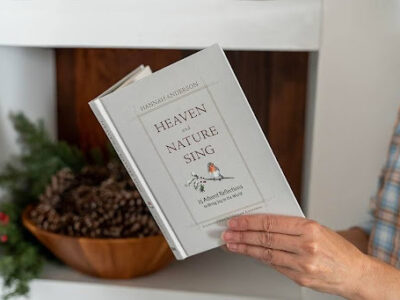It is a clear, warm, November day. The air is crisp and dry; its subtle movement stirs the leaves, lifting and loosening what remains attached to branches. The wind is so light that the leaves look like they are waving hello, or goodbye, more likely, as they twirl and then tumble free, falling in somersaults onto the forest floor, already golden brown and thick with their companions. In six months, they will be grown over and consumed by vinca minor and huge patches of pachysandra, until they decompose down to dirt and renourish the soil.
On the deck where I sit, puddles of dew and the misty rain that came overnight still cling to the boards in spots. Droplets have turned the taupe cushions tan and soaked through my slippers. We have lived here for five years now. It isn’t the longest we’ve lived in a house, but it’s the most rooted I’ve felt, both to the community and in this house, perhaps because of the long years we’ve spent huddled in it since the start of the pandemic. My neighbor is mowing and mulching the leaves on his lawn, and somewhere else in our neighborhood, a leaf blower turns on and off and on again. My dogs curl next to me as I write and squint in the bright November light, which makes the golden maple leaves glow.
It’s all right here, and it’s all with God, and I am with God, right here.
Grounded: Finding God in the World, A Spiritual Revolution by Diana Butler Bass
“Throughout my life something odd kept happening to me. God showed up,” writes Diana Butler Bass in the introduction to her book Grounded: Finding God in the World. “God, the spirit of wonder, or Jesus—it is often hard to label exactly—shows up in prayer; while walking on paths, hiking in the desert, or sitting in the sunshine; in the animals that cross my way; and in my dreams,” Bass continues. “For whatever reason, my soul has a mile-wide mystical streak.”
I put a little squiggly line under that last sentence because, girlfriend, I am so with you.
Which is why I adore Bass’s book so much. Bass uses her soul’s “mystical streak” to invite us into the way she sees God in the world, not because she has some special glasses on, but because so many of us walk around blind to the beauty and character God has revealed in his creation and in our communities. We are just too busy, too distracted, and too exhausted most of the time to sit and wax poetic about the way the leaves succumb to gravity, and other stories of love and light.
So Bass invites us to see how “there is a widespread sense that God is with us, within creation, culture, and the cosmos.” She writes, “If anything, recent decades have revealed not a dreadful, distant God, but have slowly illuminated that an intimate presence of mystery abides with the world, a spirit of compassion that breathes hope and healing.”
God With Us—All of Us
We are approaching the liturgical season of advent, the period in the church calendar that waits for and anticipates the arrival of the Messiah, Immanuel. “Immanuel” means “God with us.” It is one of the names given to describe Jesus, who promised the Spirit of Truth would be with us always (John 14:16-17). This revelation lifted the veil so that humanity could begin to see just how intimately and comprehensively God is with us. In the centuries since, as humans have explored the world, looking deeper into the universe and closer into the organisms that comprise our very being, the reality of Immanuel just keeps gathering more evidence.
“There is a pattern of God all around us—a deeply spiritual theology that relates to contemporary concerns, provides meaning and hope for the future, and possesses surprisingly rich ties to wisdom from the past,” says Bass. God is with us, all of us, and he’s demonstrating that presence in profoundly mundane spaces.
“And this revolution rests upon a simple insight: God is the ground, the grounding, that which grounds us. We experience this when we understand that soil is holy, water gives life, the sky opens the imagination, our roots matter, home is a divine place, and our lives are linked with our neighbors’ and with those around the globe.”
That one sentence forms the thesis for the remainder of Bass’s book. Divided into two parts—Natural Habitat and Human Geography—Bass explores the elemental places that give us our lives and that give our lives meaning. In Natural Habitat, chapters explore Dirt, Water, and Sky, the gritty composition of our planet that also are the places of origin for our most rich metaphors for God’s presence and character in our lives.
Then, in the section on Human Geography, Bass builds upon the foundation of these elements to show us how intrinsically connected we are to the past, to place, and to people near and far. In doing so, Bass shows us how all of this, too, is Immanuel, God with us.
This is not a truth that is limited to Bass’s experience. We are all invited into this kind of seeing and this kind of living, with eyes wide open to God’s presence in nature, in our homes, in our communities, and in our world, a kind of seeing that levels the hierarchical playing field and invites us to walk with God as God walks with us, right here, right now.
The breeze, the sun, the leaves, my dogs, my neighbors, they all welcome me into the presence of God, because they are each the face of God. Abide in this love, and we’ll together abide with God.





 Copyright
2026
Root and Vine
Copyright
2026
Root and Vine